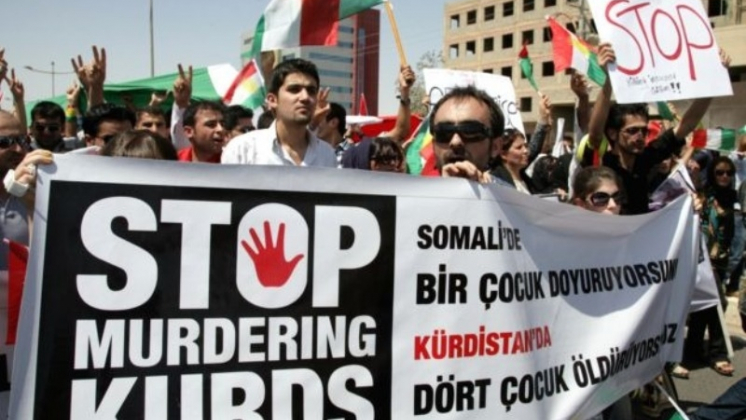Kurds and Syrian Crisis
1. History of relations
In Turkey Kurds were not recognized as national minority and had no rights. That’s why, Kurdish started clandestinewar. Striking, they retreated to remote areas of the Iraqi or Syrian Kurdistan.
After the 2003 invasion Iraqi Kurds with the support of the United States could create, de facto,their owncountry. Success in Iraq inspired the Turkish and Syrian Kurds on a new round of fighting. But the Iraqi Kurds themselves broke ties with brethrens; economic relations with Ankara turned out to be more important than solidarity.
Since the beginning of the conflict in Syria, Syrian Kurds, so called Rojava, opposed the regime, claiming toindependence. They were supported by Turkish PKK militants, ready to fight for independence anywhere. Soon so-called "moderate opposition", prepared by Turkish Islamists, appeared in Kurdish towns. With the support of the Turkish special services, Islamic militants started terror and ethnic cleansing. The Kurds took Assad side and together with the Syrian army and the militants have been fighting for the third year with terrorists.
Kobanî was an example of peaceful coexistence, without division into nation or religion, an example of a democratic Syria, in comparison withneighboring Turkey the Kurds was on firm ground, but someone did not like it, sothe ISIL came to kill and sow enmity under the guise of Islam.
2. Religious groups
Syrian Kurds are mostly Sunni, but religion does not play a big role in their lives. Marxist ideology is very popular among the Kurds: the ideas of social and gender equality. The youth prefer Yezidism and traditional Aryan beliefs, but religion for the Syrian Kurds is a part of the ethnic and cultural heritage, as well as traditional dances or food.
3. Geopolitics
In the Syrian conflict Kurds are in an unenviable position, the Syrian government is ready to grant autonomy, but it has no opportunity to support Kurds. But Turkeyis ready to bomb Kurdishlines and to arrange terrorist groups, fighting against Assad,destroying villages and killing the "infidel" Kurds. Iraqi Kurds, who have close economic ties with Turkey, also refuse to help their brethren. As a result, Syrian Kurds were not needed to anyone, all alone on their own lands.
4. Geo-economics
Rojava was consideredas theMiddle Eastgranary, producing up to 80 percent of agricultural production in the region. The main artery of the Middle East,the Tigris and the Euphrates, originates there.
Rojava is not just an agricultural region; there are oil and many other minerals resources. The Kurdistan has efficient system of self-sufficiency through rural cooperatives and industrial syndicates, but because of the blockade it is impossible to export anything.
5. Position on Syria
Rojava main airport receives military forces of Damascus and Latakia every day, Syrian and Kurdish tryingtogether to break through the corridor to the south and to raise the blockade.
The Kurdish self-defense units consists of 65 thousand people, men and women are fighting equally,there are some foreign battalions, such as the Lions of Rojavawhich has volunteers from Europe and Russia as its member. In summer the Kurds were able torelease the Hasaka, Kurdish region, and completely bring back the north territories of Syria, now they are preparing to attack on Rakka, the capital of the so-called Islamic state.
In the Syrian conflict whenevery man for himself, Kurds are fighting for their existence, they don’t matter who and where the pipeline will be settled, and how much the balance of forces of Shiites and Sunnis will change. They just want to live on their land peacefully.


